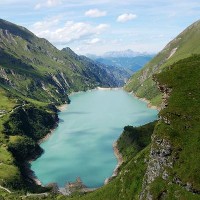21 May 2015
Energy and nature in the Alps: a balancing act
Researchers from the international recharge.green project presented their results at the final conference in Sonthofen, Germany. IIASA researchers provided the modeling framework to support the project from a scientific standpoint.
When we use water, biomass, wind and sun for the production of energy in the Alps, this all benefits the climate. Yet the production of renewable energy can also have negative effects on the various services provided by nature, such as clean water and air, carbon sequestration, and recreation opportunities The recharge.green project is contributing to the sustainable use of landscapes where ecosystems can continue to operate and provide services for people, while at the same time improving power generation.
The recharge.green experts have estimated the potential of renewable energy from wind, water, forest biomass and solar energy in the Alpine countries. They have developed scenarios to recognize any conflicts of aims with nature conservation, environmental protection and other ecosystem services. A decision support system has also been developed for decision makers and energy producers, which has for example shown that, for example, hydropower generation could be increased by 10% in an economically and ecologically sustainable way.
Chris Walzer, recharge.green’s coordinator and professor at the the University of Veterinary Medicine in Vienna describes the challenge, “The results generated by our decision support system merely provide a basis for discussion. Decisions are only balanced once all stakeholders have been heard and a solution found that permits all parties to achieve the greatest possible consensus.”
Modeling the tradeoffs
At the conference, IIASA researchers Florian Kraxner and Sylvain Leduc presented the results of their work on the recharge.green project, a set of around 150 scenarios which show a whole range of possible development pathways for four types of renewable energy: wind, hydropower, solar, and biomass. These scenarios form the basis of the decision support system aimed at policymakers.
The scenarios attempt to provide a holistic range of possibilities for renewable energy development in the Alps. In addition to the mix of renewable energy, policymakers and other stakeholders will be able to set different levels of ecosystem protection, different energy targets, fossil fuel price, and carbon price. Changing these variables will allow them to see how their choices and possible outside influences like fossil fuel price fit in with their goals.
Kraxner says, “Only a healthy mix of all different kinds of renewable energy technologies – tailor-made for the respective situation and location – can bring maximum benefit from the climate change mitigation, energy substitution and ecosystems services points of view. However, our results indicate that wind and solar technologies may have the largest potential, when looking for the least environmental invasive and at the same time most economic solutions.”
Leduc says, “The recharge.green project shows in a unique manner and with high geographic resolution, where in the alpine space which renewable technology fits optimally the regional conditions and constraints.”
More fish-friendly use of hydropower
To ensure that the results of the project can be implemented in practice and optimized on the basis of actual experience, the recharge.green partners have tested the instruments and models in pilot areas and examined their transferability to other Alpine regions. The pilot areas have informed the local and regional stakeholders as well as the public of the results. In Bavaria, for example, the use of hydropower on the River Upper Iller was investigated and different measures to improve the (fish-) ecological potential have been developed, as Gerhard Haimerl of the Bayerische Elektrizitätswerke GmbH (Bavarian electricity company) explains.
Project results attract international attention
Under the motto “Balancing Alpine energy and nature”, the project partners will be presenting their findings to the public on 20 and 21 May 2015 at the final conference to be held in Sonthofen, Germany. Some 100 participants from every Alpine country will witness a demonstration of the decision support system created by recharge.green. Representatives from the pilot areas will report on their experiences of the processes developed for resolving conflicts of aims between energy use, nature and landscape. There will also be external contributions to the program, for example from Swiss expert Astrid Björnsen Gurung or from Georg Bayerle, the Bavarian broadcasting service’s specialist in mountains and the environment.
Print quality image material available at www.recharge-green.eu/medien.
recharge.green – balancing Alpine energy and nature
The Alps have great potential for the use of renewable energy. Thereby they can make a valuable contribution to mitigating climate change. This, however, means increasing pressures on nature. What could be the impact of such changes on the habitats of animals and plants? How do they affect land use and soil quality? How much renewable energy can reasonably be used? The project recharge.green brings together 15 partners to develop strategies and tools for decision-making on such issues. The analysis and comparison of the costs and benefits of renewable energy, ecosystem services, and potential trade-offs is a key component in this process. The project runs from October 2012 to June 2015 and is co-financed by the European Regional Development Fund in the Alpine Space Programme.
CONTACT DETAILS
Research Group Leader and Principal Research Scholar Agriculture, Forestry, and Ecosystem Services Research Group - Biodiversity and Natural Resources Program
Senior Research Scholar Agriculture, Forestry, and Ecosystem Services Research Group - Biodiversity and Natural Resources Program


